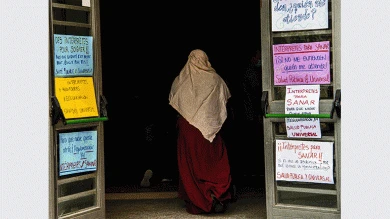-
BREATHE, CO-INSPIRE
-
Meeting: Language or Death
Publication
Organised by: Museo Situado
Razib, Afroza and Elahi are migrants. They were born in Bangladesh and live in Madrid. On 26 March, at the height of the healthcare emergency caused by COVID-19, their fellow countryman, Mohamed Hossein, died in confinement after calling the health authorities over a six-hour period. Hossein didn’t speak fluent Spanish, and no doctor went to tend to him. Since then, all three, together with migrant and social organisations, have demanded compulsory interpreting in health centres, schools, courthouses, and State offices. Over the course of April 2020, poet Dani Zelko spoke to them by phone while under lockdown in Buenos Aires, with the exchanges, accounts and silences of Razib, Afroza, Elahi and Pepa leading to the publication Lengua o muerte (Language or Death), framed inside the project Meeting by this Argentinian artist and publisher.
Participants: Dani Zelko with Rakibul Hasan Razib, Elahi Mohammad Fazle, Afroza Rhaman and Pepa Torres Pérez
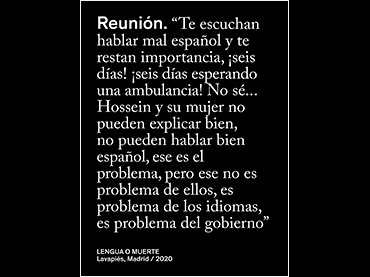
-
Udlot, Udlot, by José Maceda
Concert
Video of the concert: Udlot, Udlot, by José Maceda
In March 2019, the Museo opened a call to participate in the performance of the piece Udlot Udlot (1975), by Philippine composer José Maceda, whose work combined his interest in traditional music from Southeast Asia and Europe. The performance of the piece required no prior musical knowledge, simply attendance at a workshop organised by the Museo, in collaboration with the Escuela Municipal de Música y Danza del Distrito Centro María Dolores Pradera. Some one hundred people learnt the score together and kept in time with its rhythms. During the current pandemic, the experience reminds us of something essential: the power of union and respectful co-existence, not only between humans but with all other living organisms on the planet.
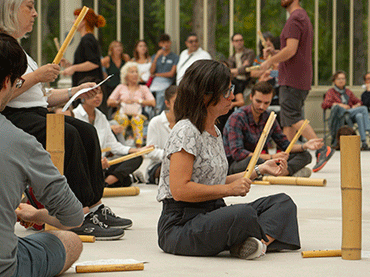
-
Raciality and Care in the Dispute for Other Lives
Lecture
Link to the lecture: Keeanga-Yamahtta Taylor and Yayo Herrero
In this lecture from the series Six Contradictions and the End of the Present, African American activist and theorist Keeanga-Yamahtta Taylor and anthropologist, technical engineer, social educator and ecofeminist Yayo Herrero reflect on care as the starting point for thinking about a more just and equal society, putting forward a life outside of ideas of production and economic value. Taylor focuses on the need to confront present-day racism in the USA, now a structural effect of a system which seeks to create a State of terror, while Yayo Herrero analyses how care has become precarious and circumscribes migrant collectives and women as they are essential but dismissed from all social considerations.
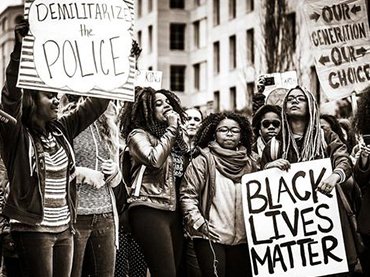
-
Breathing
Reading group
During the early days of confinement, the Museo’s Public Activities Department came up with the idea of sharing readings and discussing them each week. These texts and encounters have woven together a place for either joint thinking and sharing common feelings and questions, or simply to get some breathing space. “It is no coincidence that the term ‘aspiration’ means both hope and the act of breathing,” we hear in The Great Silence (2014), a work by artists Allora & Calzadilla with a text by science-fiction writer Ted Chiang. Shortness of breath is one of the most persistent symptoms of the current virus and also a trait of the different wars against living, as recalled by philosopher Achille Mbembe in a recent text “The Universal Right to Breathe”, which is shared here. The readings and conversations include texts written under lockdown by the group’s participants, for instance “Algunas herramientas para escuchar esta pandemia: calma, silencio y quietud (Some Tools for Listening to this Pandemic: Calm, Silence and Stillness)” y “No tener olfato (No Sense of Smell)”, and the video-letter “Planta baja (Ground Floor)”.
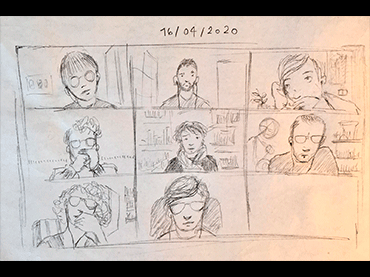
-
Fluxus to the People. Reactivations
Journeys Through the City
Journeys (Spanish version):
Espacios de batalla. Paisaje transversal
Tour de la Represión. Todo X La Praxis
Cunctatio 2024. Ficciones-paisaje en torno a la Carta de los Comunales Metropolitanos. Cunctatio
In conjunction with International Museum Day, part of the programme Fluxus to the People, organised by the Museo in 2012, is reactivated, with its invitations to open, playful and activist collectiveness by way of art actions from the Fluxus movement. More specifically, there is the restoration of routes around Madrid designed by artists, architects and urban planners, drawing inspiration from “fluxtour” critiques of gentrification in New York neighbourhoods. In the current landscape, where the only possible urban interaction is walking, these critical routes around care and memories of the city can be carried out.
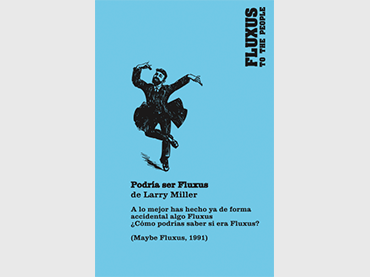
-
TOUCH, AFFECT
-
With Three Wounds, I
Exhibition and Encounter
Exhibition: from Monday 18 May 2020
Encounter: Monday, 25 May 2020 – 6pmThis second photographic exhibition on the experience of confinement spotlights six photographic stories from the interior and intimacy of lived spaces, spaces which can be a refuge at certain times and a place of hostility at others. In these accounts the camera has served as therapy, condemnation, diary and a footprint of occurrences, where that which is photographed shows itself, once more, as an encounter between the bodies of those taking pictures, those letting themselves be photographed and those we see.
Artists: Olmo Calvo, Rubén H. Bermúdez, Edu León, Roberta Marrero, Isabel Permuy and Judith Prat
Curated by: Inés Plasencia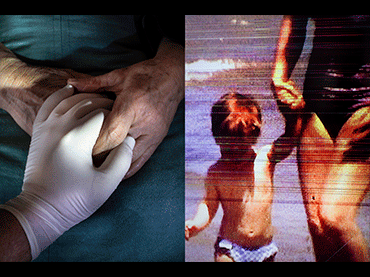
-
The Touching Community. Aimar Pérez-Galí
Interview
Interview Iink: RRS. Aimar Pérez Galí. The Touching Community (Spanish Audio)
An interview with choreographer, dancer and researcher Aimar Pérez Galí, coinciding with the presentation of The Touching Community in the Museo Reina Sofía in December 2017. The piece creates a space of trust and mutual understanding, where bodies with different training and ages touch and are touched to an out-loud reading of letters Pérez Galí wrote to dancers who fell victim to AIDS. One, addressed to Felipe, a dancer from Madrid, can be heard on this radio podcast.
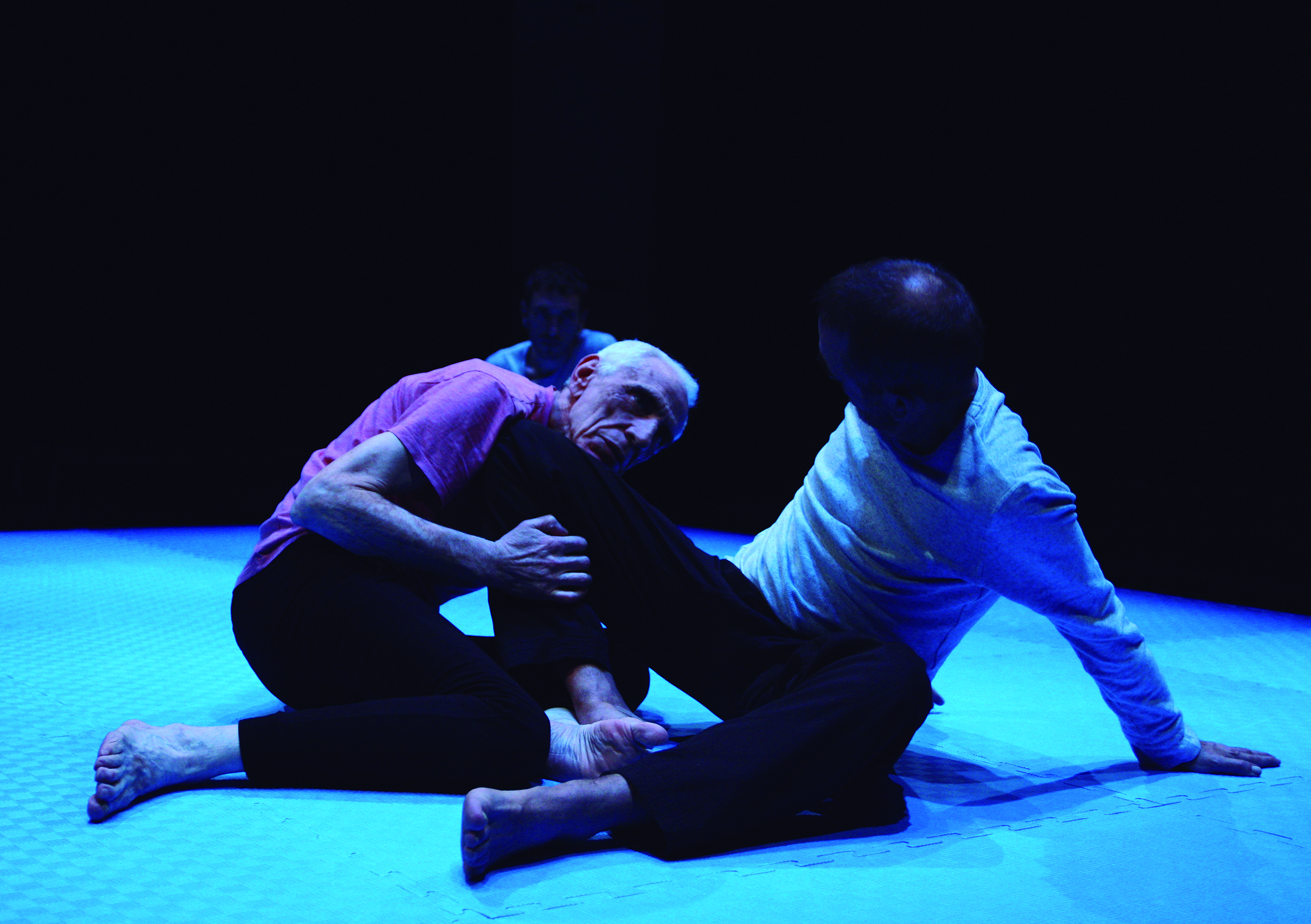
-
Blinking. An Accessible and Inclusive Performance
Performance
In 2019, the women’s group La profesión va por dentro (The Profession Is Inside) conducted research into the Museo’s Collection and temporary exhibitions, granting privilege, from their varyingly adept bodies, to the emotions and role of the body when relating to the works and museum space. The upshot of this work was presented in the stage piece Blinking. An Accessible and Inclusive Performance (its research process and images are available on the Museo Reina Sofía website), whereby participants reflected upon the physical Museo’s accessibility and cognitive barriers, as well as the security protocols conditioning the visit. The group are currently working on the project Gestos CoVidianos on the lockdown situation and its effects on their bodies.
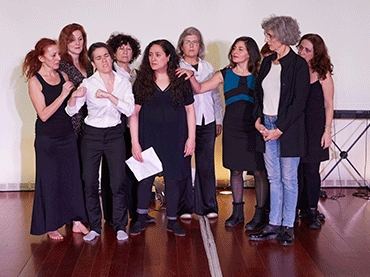
-
With All My Affection
Handwritten dedications in the library of Jean Cassou
The personal library of Jean Cassou (1897–1986), the renowned French Hispanist and art critic, is part of the holdings of the Museo Reina Sofía Library and Documentation Centre. Consulting its contents reveals the most relevant works from the twentieth-century’s Spanish and Latin American literary landscape, in addition to an ensemble of handwritten dedications that reveal a story of affection. Noteworthy figures such as Ramón Gómez de la Serna, Max Aub, María Teresa de León, Jorge Guillén, Eugenio D’Ors, Miguel de Unamuno, Pedro Salinas and Manuel Altolaguirre were part of Cassou’s close circle, which in turn made the Parisian house on rue du Figuier a place for the sharing of work and friendship. This brief selection of images is also a foretaste of the digital Library project, which will offer digital access to a significant part of the Museo’s bibliographical collections.
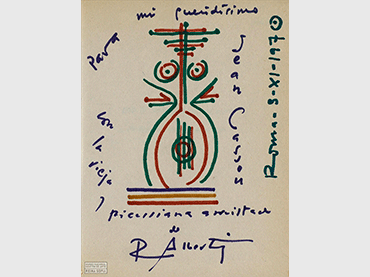
-
Breaking La Casa (The Crevice House): Transmitting the Intimate, Inventing Ourselves Together
Artistic process with Aitana Cordero
From Monday 25 to Sunday 31 May 2020
Participation with prior registration; aimed at young people aged between 15 and 21La Casa (The House) is a vast project full of ramifications and has been developed by artist Aitana Cordero over the past four years. Its point of departure is the idea of “how to destroy a theatre, how to build a house, us, together”, and takes the form of four performance pieces and a number of workshops in different parts of the world. Initially planned to be conducted on-site in the Museo, this workshop has been radically transformed by the lockdown: What is intimacy now? What do we want to transmit? Cordero joins a group of teenagers and young people aged between 15 and 21 to break down the walls of the many confinements to which our bodies are subjected, with the aim of imagining new places of encounter and rethinking the ties that bring us together in the here and now.
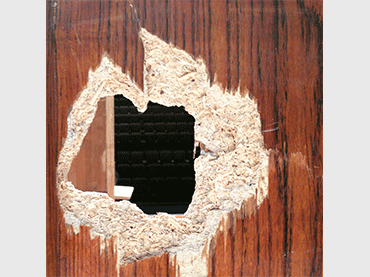
-
TREAT, AVERT
-
Driving Away Evil
A study group publication
Download Espantando el mal (Driving Away Evil)
Active since February 2020, this study group addresses the ‘pharmaceuticalization’ of life and contemporary disturbances, thus pooling forms of resistance against neoliberal logics. During this healthcare emergency, the group will draft a virtual diary series to reflect on how life has radically changed, an edition presented on International Museum Day and made from fragments of the diary in the form of a collage of images and words as it seeks to become a momentary record of an ongoing autobiographical and multiple-voiced discussion on the current unknown.
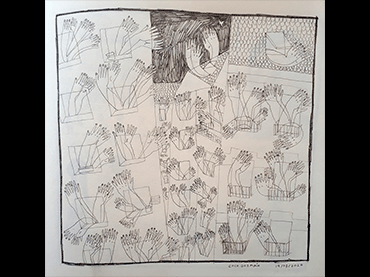
-
Ecologies of Care in the Welfare State Crisis. A Dialogue Between Madrid and Trieste
Sessions
Round-table discussion. Enter Outside in Community Healthcare: Experimenting with Militant Research
In April 2019, the Museo organised these sessions on experiences of community healthcare in Madrid and Trieste with regard to institutional critique in the field of psychiatry and, specifically, to the work of Franco Basaglia. At the same time, the activity set out from the research residency Marta Malo, Marta Pérez and Pantxo Ramas carried out in 2016 in the Museo Reina Sofía Study Centre, resulting in the project Enter Outside. From the Public and the Commons.
Organised around two round-table discussions, the programme analysed the history and present of care institutions devised in light of 1970s institutional critique movements. Its contributions can now be reviewed in the context of a museum with aspirations of care.
-
The Death of the Clinic?
Lecture by Paul B. Preciado
Audio: ¿La muerte de la clínica? (The Death of the Clinic?)
The title of this lecture given by philosopher Paul B. Preciado in 2013 during the opening session of the programme Somateca draws inspiration from Michel Foucault’s The Birth of the Clinic (1963). By way of an analysis of the conquests of twentieth-century feminist and homosexual politics, which sought to dismantle the disciplinary institutions denounced by Foucault, Preciado explores models of the somato-political management of contemporary neoliberal societies. This recording of the lecture prompts us to consider the currency of these reflections, and to rethink the politics of care as a critical instrument of museum institutions.
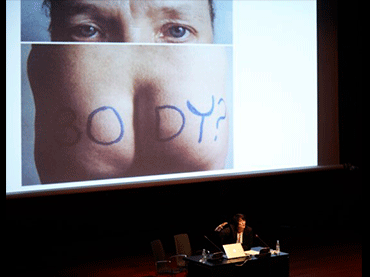
-
Time. Claudia Claremi
Audiovisual mediation project
FRAGMENT 1
FRAGMENT 2
FRAGMENT 3Time is a work in progress which, via the collective creation of an experimental film, explores the personal and collective memories of the Museo’s team of volunteers. The project got under way in 2019, with the line of argument of a dystopian present: in the wake of the collapse of modern society, Western culture has lost its hegemonic place and its institutions, such as museums, fall by the wayside. To this backdrop, the volunteers appear as a group of people that inhabit and preserve the Museo. The current shutdown of society has deeply shifted the meaning of the project, so much so that what was recorded as fiction now seems a plausible reality. The film, currently in the editing stage and presented here in three fragments, transposes experiences of attention towards and silent dialogue with artworks, as well as different ways of inhabiting and traversing museum space.
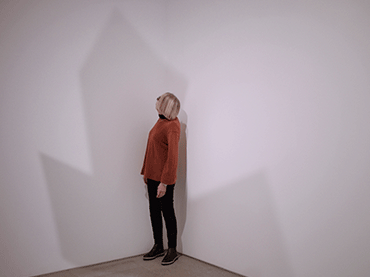
-
Situated Feminist Pedagogies
Encounter
The reflection and dialogue around feminist pedagogies in a context of confinement like the present one, in which the education community finds itself stretched to the limit in an unprecedented dislocation of its schools, in the desire to establish a virtual education model for which nobody was prepared, can end up in itself being an exercise in care. This conversation between Alicia Bernardos, Irene Martínez, Analía Villagrán and Rosa Mari Ytarte, which took place in 2018 in the context of the programme Perturbable School, analyses key issues in education: power relations opposite care relations; bridges between scientific knowledge, popular knowledge and the role of experience; the diversity of subjects, bodies and identities; sorority networks opposite the impositions of capital.
![Gertrude Käsebier, Blessed Art Thou Among Women [Bendita tú eres entre todas las mujeres], 1899. Alfred Stieglitz Collection, 1933. The Metropolitan Museum of Art Gertrude Käsebier, Blessed Art Thou Among Women [Bendita tú eres entre todas las mujeres], 1899. Alfred Stieglitz Collection, 1933. The Metropolitan Museum of Art](https://recursos.museoreinasofia.es/legacy_programs/pedagogias-peq.gif)
Taking Care of Ourselves: For a Hospitable Museum
Special online programme. International Museum Day 2020
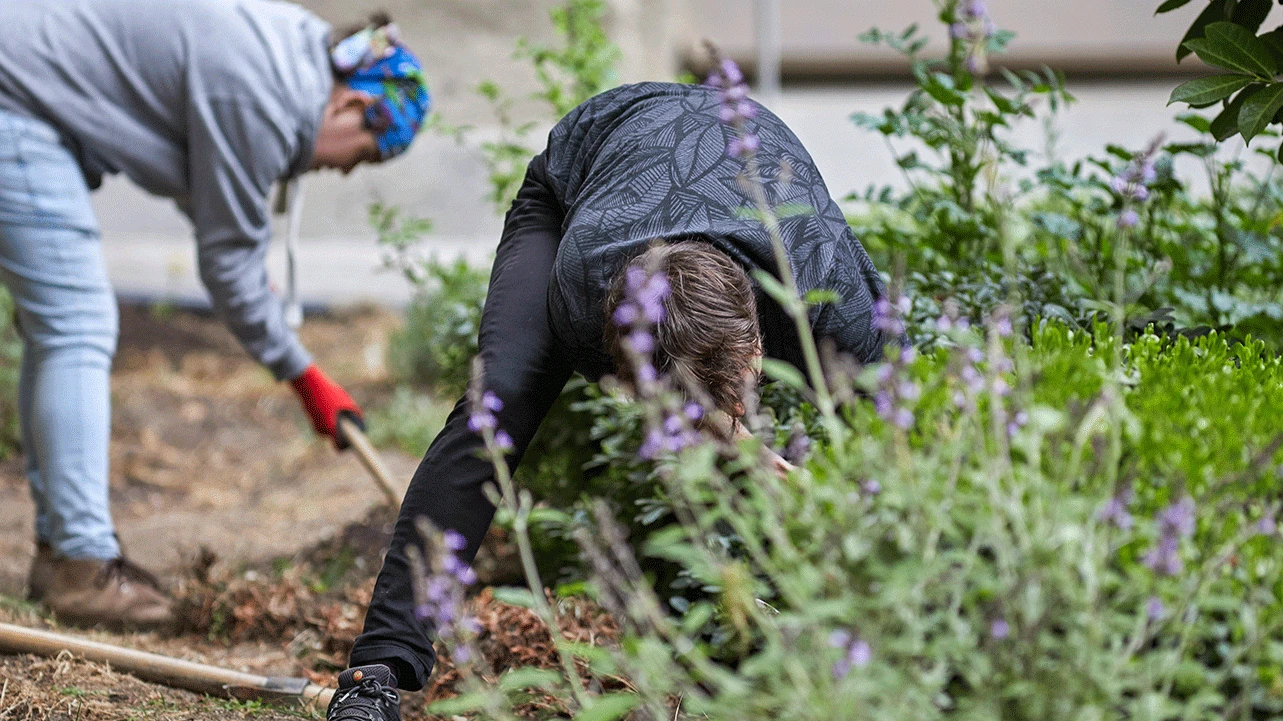
Held on 14 May 2020
This special programme, organised in conjunction with International Museum Day, melds the lines of work developed by the Museo Reina Sofía with the contours of a timeline of interventions which places care and the sustainability of life as an inescapable ethical priority. Taking Care of Ourselves is an ongoing action about ourselves and others, a proposal with which to put forward initiatives to question this emergency present while searching in archives and past activities to bring forth the practices and reflections accompanying us at this current moment. This analysis, however, of the current situation cannot get away from questions regarding the future, for it becomes necessary to imagine, together, the world ahead that we all want.
Today we inhabit the Museo with a vividly perceived memory of what it once was: a hospital shaken by the epidemic of the so-called Spanish flu at the beginning of the twentieth century. Amidst another ferocious pandemic, the role of the Museo as a public institution gains new meaning and is re-considered in all its dimensions and forms of expression. It is a museum that wishes to be situated and is located in a neighbourhood with residents who, like so many others, have been seriously affected by the disease — overcrowding, a lack of basic resources, rising rent prices — but also with networks of solidarity and self-organisation which once again demonstrate its vitality.
This image of a collective work in the Museo’s garden — where different life forms and temporalities co-exist — evokes, together with the memory of the former hospital, the power of mutual care in sustaining human and non-human life. By means of the hospital-garden-museum constellation, the present programme is organised into three blocks of activities, grouped together by poetic affinity and prompting a reflection of care through the senses: “Breathe, Co-inspire” stresses the need for community as a survival condition; “Touch, Affect” alludes to sensitive experiences and contact with others; and, finally, “Treat, Avert” calls upon the need for assistance around the environment in which we are situated, in addition to imagining forms of protection and transformation.
Más actividades

Difficulty. Forms and Political Effects of Deviation in Writing and Contemporary Art
23 February – 14 December 2026 – Check programme
Difficulty. Forms and Political Effects of Deviation in Writing and Contemporary Art is a study group aligned towards thinking about how certain contemporary artistic and cultural practices resist the referentiality that dominates the logics of production and the consumption of present-day art. At the centre of this proposal are the concepts of difficulty and deviation, under which it brings together any procedure capable of preventing artistic forms from being absorbed by a meaning that appears previous to and independent from its expression. By ensuring the perceptibility of their languages, difficulty invites us to think of meaning as the effect of a signifying tension; that is, as a productive and creative activity which, from the materiality of art objects, frees aesthetic experience from the representational mandate and those who participate in it from the passiveness associated with tasks of mimesis and decoding.
The economy of the referential norm translates the social logic of capitalism, where insidious forms of capturing subjectivity and meaning operate. In the early 1980s, and adopting a Marxist framework, poet Ron Silliman highlighted how this logic entailed separating language from any mark, gesture, script, form or syntax that might link it to the conditions of its production, rendering it fetichised (as if without a subject) and alienating its users in a use for which they are not responsible. This double dispossession encodes the political strategy of referential objectivity: with no subject and no trace of its own consistency, language is merely an object, that reality in which it disappears.
The political uses of referentiality, more sophisticated today than ever before, sustain the neoliberal-extractivist phase of capitalism that crosses through present-day societies politically, economically and aesthetically. Against them, fugitive artistic practices emerge which, drawing from Black and Queer studies and other subaltern critical positions, reject the objective limits of what exists, invent forms to name what lies outside what has already been named, and return to subjects the capacity to participate in processes of emission and interpretation.
Read from the standpoint of artistic work, the objective capture of referentiality may be called transparency. Viewed from a social contract that reproduces inequality in fixed identity positions, transparent in this objectivity are, precisely, the discourses that maintain the status quo of domination. Opposite the inferno of these discourses, this group aims to collectively explore, through deviant or fugitive works, the paradise of language that Monique Wittig encountered in the estranged practices of literature. For the political potency of difficulty — that is, its contribution to the utopia of a free language among equals — depends on making visible, first, its own deviations; from there, the norm that those deviations transgress; and finally, the narrowness of a norm which in no way exhausts the possibilities ofsaying, signifying, referring and producing a world.
From this denouncement of referential alienation, fetishisation and capture, Difficulty. Forms and Political Effects of Deviation in Writing and Contemporary Art turns its attention to the strategies of resistance deployed by contemporary artists and poets. Its interest is directed towards proposals as evidently difficult or evasive as those of Gertrude Stein, Lyn Hejinian, Theresa Hak Kyung Cha, Kameelah Janan Rasheed, Kathy Acker, María Salgado and Ricardo Carreira, and as seemingly simple as those of Fernanda Laguna, Felix Gonzalez Torres and Cecilia Vicuña, among other examples that can be added according to the desires and dynamics of the group.
The ten study group sessions, held between February and December, combine theoretical seminars, work with artworks from the Museo Reina Sofía’s Collections and exhibitions, reading workshops and public programs. All these formats serve as spaces of encounter to think commonly about certain problems of poetics — that is, certain political questions — of contemporary writing and art.
Difficulty. Forms and Political Effects of Deviation in Writing and Contemporary Art inaugurates the research line Goodbye, Representation, through which the Museo Reina Sofía’s Studies Directorship seeks to explore the emergence of contemporary artistic and cultural practices which move away from representation as a dominant aesthetic-political strategy and redirect their attention toward artistic languages that question the tendency to point, name and fix, advocating instead for fugitive aesthetics. Over its three-year duration, this research line materializes in study groups, seminars, screenings and other forms of public programming.
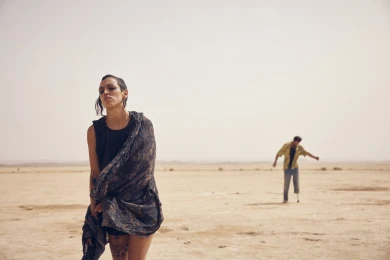
LANDSCAPE TRANCE. THE FILMS OF OLIVER LAXE
From 5 to 28 February 2026 – check programme
Over this coming month of February, the Museo organises a complete retrospective on the filmography of Oliver Laxe. The series converses with the work HU/هُوَ. Dance as if no one were watching you, an installation by the Sirāt director conceived specifically for the Museo Reina Sofía’s Espacio 1, and includes the four feature-length films Laxe has made to date, as well as his short films and a four-session carte blanche programme, in which he will select works that chime with his films and creative concerns.
Oliver Laxe’s gaze is one of the most unique in the contemporary film landscape, his film-making a resilient, spiritual and transcultural space imbued with a cultural and social nomadism that reflects his life and beliefs and which, fundamentally, puts forward an anti-materialist ethic to deal with our times. His filmography, characterised by profound spirituality, a time of contemplation and a close connection to nature and the sacred, approaches universal themes such as redemption and the meaning of existence via stories that extend across remote, rural and timeless landscapes, and with atmospheres that draw on western and police film genres. His protagonists, largely amateur actors, cross through physical territories while travelling on inner journeys consumed by guilt, the desire for community reintegration and the realisation of an end goal they ignore. Nature, particularly desert and landscape, is another character, a living, pantheistic presence that conditions and reflects human conflicts. Stretched-out time, a focus on sensory experience and allusions to ancient religion situate us in a meditative conception of film which seeks to be a manifesto to re-enchant the world.
Within the series, the carte blanche sessions see the film-maker choose four films which map his obsessions: Sergei Dvortsevoy’s Highway (1999), which crosses the plains of Kazakhstan via a small travelling circus; Artavazd Peleshyan’s film The Seasons (1975), an ode to the passing of time through landscape; Trás-os-Montes (1976), an ethnographic work of fiction, made by Antònio Reis and Margarida Cordeiro, spotlighting a Portuguese farming community and their rituals and purity of life; and Kaneto Shindo’s The Naked Island, which shows a family of four’s daily struggle in a natural paradise.

Cultural Work
Thursday, 12 February 2026 – 5:30pm
This series is organised by equipoMotor, a group of teenagers, young people and older people who have participated in the Museo Reina Sofía’s previous community education projects, and is structured around four themed blocks that pivot on the monstrous.
Session number two looks to approach film as a place from which cultural work is made visible and processes of production engage in dialogue with artistic creation. From this premise, the session focuses on exploring how audiovisual content is produced, assembled and distributed, from the hands that handle the images to the bodies that participate in its circulation. The aim is to reflect on the invisible effort, precarity and forms of collaboration that uphold cultural life, that transform the filmic experience into an act that recognises and cares for common work.

Alberto Greco. Viva el arte vivo
Tuesday, 10 February 2026 – 7pm
In conjunction with the opening of the exhibition Alberto Greco. Viva el arte vivo, Fernando Davis, the show’s curator, and Amanda de la Garza, the Museo Reina Sofía’s deputy artist director, will converse in the Nouvel Building’s Auditorium 400 on the life and work of the Argentinian artist, a core figure in experimental avant-garde art.
The title of both exhibition and conversation originates from the proclamation “Long Live Arte Vivo” Alberto Greco (Buenos Aires, 1931— Barcelona, 1965) disseminated around the streets and on the walls of Rome. For Greco, arte vivo was an art of the future, an art based on a set of irreverent and untimely gestures, of adventures open to unpredictability melding with life, and which began in 1962, prior to his coining of the term “vivo-dito”. In his Manifiesto dito dell´arte vivo (Dito Arte-Vivo Manifesto), which he pasted on the walls of Genoa, Greco encouraged new contact “with the living elements of our reality: movement, time, people, conversations, smells, rumours, places, situations”. He would also burst into the everyday of Madrid’s streets as he convened a “vivo-dito moment”, culminating in the burning of a canvas painted collectively in Madrid’s Lavapiés neighbourhood.
In addition to founding arte vivo, Alberto Greco was an informalist painter, a queer flâneur, a poet and sometime actor. This intense journey of Greco’s life and art is closely connected to the migrant route he embarked upon in 1950 in Buenos Aires, taking in Atacama and Humahuaca, Paris, Rio de Janeiro, São Paulo, Genoa, Rome, Madrid, Piedralaves, New York and Ibiza and ending abruptly in Barcelona, where he took his own life shortly after writing his final great work, the novel Besos brujos (Bewitching Kisses, 1965).
These inaugural conversations, part of the main working strands of the Museo’s Public Programmes Area, aim to explore in greater depth the exhibition narratives of the shows organised by the Museo from the perspective of artists, curators and specialists.
![Basel Abbas y Ruanne Abou-Rahme, At Those Terrifying Frontiers Where the Existence and Disappearance of People Fade Into Each Other [En esas fronteras aterradoras donde la existencia y la desaparición de personas se disuelven entre sí], 2019](https://recursos.museoreinasofia.es/styles/small_landscape/public/Colecci%C3%B3n/abbasabourahme.png.webp)
Gaza and Aestheticide
Tuesday February 10, 2026 – 16:00 h
“This seminar examines the systematic destruction of Palestinian collective sensibility — what we might call ‛aestheticide’ — that has accompanied Israel’s genocide and ecocide in Gaza, and considers the conditions of artistic practice in its aftermath. Over more than two years, the demolition of universities, archives, museums, and libraries has not only erased cultural and intellectual infrastructure but has also targeted the very possibility of representation itself. The destruction of a people has been accompanied by the destruction of their image, their history, and their capacity to be known: reportage, scholarship, and cultural memory have been deliberately undermined, with media institutions, universities, and museums often complicit in this repression. Gaza consequently functions as a rehearsal space for a possible global future — of fascism, post-liberal authoritarianism, militarized borders, and AI-enabled warfare —, a laboratory for an emerging world order. What, then, becomes of critical analysis and resistance under these conditions? And what becomes of aesthetics and politics?”
—T.J. DemosThis seminar takes place thanks to the art historian’s invitation to Spain by the Miró Foundation. In the context of the museum, it engages in dialogue with a broader line of work on the climate emergency and decolonial perspectives developed within the Museum of the Commons project (2023–2026) of the L’Internationale network, of which the Museo Reina Sofía is a member; as well as with some of the questions that animate the study group Aesthetics of Peace and Desertion Tactics. Finally, it is also embedded in a wider strategy of support for and commitment to the artistic and discursive practices of Palestinian artists and cultural practitioners, most clearly reflected in the TEJA network.
